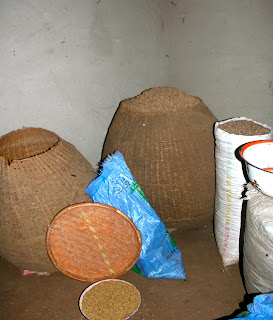PEACE MOTHERS JOURNEY DAY FIVE VILLAGE ONE
December 21, 2012
We will visit one village today on our way back to Freetown. The schedule calls for two but the other village is preparing a funeral for an elder who has just died.
 |
| Walking To The Casava Farm |
The village is geographically divided by the main road. We cross the road and begin the long walk through the fields to the Peace Mothers Casava Farm. They are waiting for us with the usual dancing and singing of which I never tire. There is a very lively clown amongst the dancers.
 |
| Peace Mother Chair |
The Peace Mother Chair explains how they chose the land for the farm and then rented a tractor for ploughing. They faced and overcame the obstacle of the machine breaking down in the middle of the job and the owner of the machine pressing them to return it. As a result the field is not quite as large as planned, but they still have plenty of trees.
 |
| Peace Mothers With Casava Root. Note Casava Trees Behind |
The casava is the root of the tree. When it is time for harvest the entire tree is broken off and the root dug out. This, too, is back breaking, labor intensive work. The clown helps to keep the people laughing and singing while they work. The whole tree is used. The leaves are consumed as a green in a sauce with rice or Fou Fou (fermented casava). Casava is also made into Goree, a tapioca like pudding with sugar added. Casava can be peeled, boiled and formed into balls. The balls are then eaten with spicy beans. I have had Fou Fou and the balls, but not Goree yet. It is a major staple and inexpensive.
 |
| "Sticks" To Use For Planting |
The trunks (very thin with sections like a succulent) of the tree are called sticks. They take the sticks and break them into shorter pieces, bundle them up, place them in a cool place like by a river and cover them with straw. They stay this way until time for planting. The sticks are shoved into the ground, watered and tended until they make new trees.
This village also smokes fish, but the casava farm is a new venture and the result of the Fambul Tok process. This is their first harvest and they are very excited about how well the trees are doing. Not to belabor the point, but Fambul Tok is loved and revered here as well.
The need in this village is to have a casava grater so they can preserve the root and not have to sell it all right away.
When I am walking to and from the farm I look out onto a vast African veld. I expect to see elephant, giraffe and antelope in the distance, but Salone does not have many animals. There are some elephants in a protected area that is very far away and difficult to get to. They also have a Chimp preserve which I visited when in Freetown last year during the trip up the African west coast.
We are fed yet again and then make our way back to Freetown. I am feeling so blessed to have had all the variety of experiences these past few days. I can’t think of any way the journey could have been better or more complete. The culture is varied yet the same in the different districts and I have come to know and love it all.
Fambul Tok is an amazing miraculous program that is truly healing the country one community at a time through the power of forgiveness.
Much Love To You All,
Mom/Grandma/Sara

























